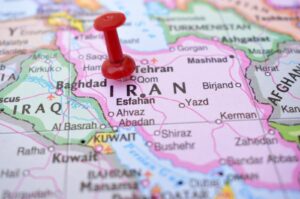Russia and Germany called for restraint in the Middle East on Thursday, while Israel stated its readiness to fulfill all its security needs in response to heightened tensions over Iran’s threat to strike Israel.
Lufthansa, the German airline and one of the two Western carriers operating flights to Tehran, announced an extension of its suspension of flights to the Iranian capital. Meanwhile, Russia advised against travel to the Middle East amid the escalating situation.
Iran has vowed retaliation for the April 1 airstrike on its embassy compound in Damascus, which resulted in the deaths of a top Iranian general and six other military officers.
This incident has further strained the already tense region due to the Gaza war.
Although Israel has not claimed responsibility for the attack, Iranian Supreme Leader Ayatollah Ali Khamenei stated on Wednesday that Israel “must be punished and it shall be,” likening the airstrike to an attack on Iranian soil.
The imperative for Iran to punish this rogue regime might have been avoided had the U.N. Security Council condemned the strike and brought the perpetrators to justice, Tehran’s mission to the United Nations said on Thursday.
Prime Minister Benjamin Netanyahu said Israel was maintaining its war efforts in Gaza but making security preparations elsewhere.
“Whoever harms us, we will harm them. We are prepared to meet all of the security needs of the State of Israel, both defensively and offensively,” he said in comments released following a visit to an air force base.
Iran has signaled to Washington that it will respond to Israel’s attack in a way that aims to avoid major escalation and will not act hastily, Iranian sources said.
The conflict has spread across the Middle East since the eruption of the Gaza war, with Iran-backed groups declaring support for the Palestinians waging attacks from Lebanon, Yemen and Iraq. Tehran has avoided direct confrontation with Israel or the United States while declaring support for its allies.
German Foreign Minister Annalena Baerbock called on her Iranian counterpart Hossein Amirabdollahian to urge “maximum restraint” to avoid further escalation.
Russia’s Foreign Ministry told citizens they should not travel to the Middle East, especially to Israel, Lebanon and the Palestinian territories.
“Right now it’s very important for everyone to maintain restraint so as not to lead to a complete destabilization of the situation in the region, which doesn’t exactly shine with stability and predictability,” Kremlin spokesperson Dmitry Peskov told a news briefing.
Potential for miscalculation
British Foreign Minister David Cameron said on Thursday he had made it clear to Amirabdollahian that Iran should not draw the Middle East into a wider conflict.
“I am deeply concerned about the potential for miscalculation leading to further violence,” Cameron said on X.
U.S. State Department spokesperson Matthew Miller said Secretary of State Anthony Blinken called counterparts including the Turkish, Chinese and Saudi foreign ministers “to make clear that escalation is not in anyone’s interest and that countries should urge Iran not to escalate.”
U.S. President Joe Biden said on Wednesday that Iran was threatening to launch a “significant attack in Israel,” and that he had told Netanyahu that “our commitment to Israel’s security against these threats from Iran and its proxies is iron-clad.”
Iran is the third-largest oil producer in the Organization of the Petroleum Exporting Countries (OPEC) group, and oil prices stayed near six-month highs on Thursday.
Late on Wednesday, an Iranian news agency published an Arabic report on the X platform saying the airspace over Tehran had been closed for military drills, but then removed the report and denied it had issued such news.
Lufthansa said it would probably not fly to Tehran before April 13. Austrian Airlines said it was still planning to fly on Thursday but was adjusting timings to avoid crew having to disembark for an overnight layover.
Iranian airspace is also a key overflight route for Emirates’ and Qatar Airways’ flights to Europe and North America.
Emirates, Qatar Airways, Turkish Airlines, Aeroflot and Air Arabia, are among the airlines that fly to Tehran but did not immediately respond to requests for comment.




















































Be First to Comment